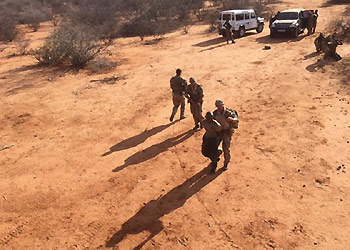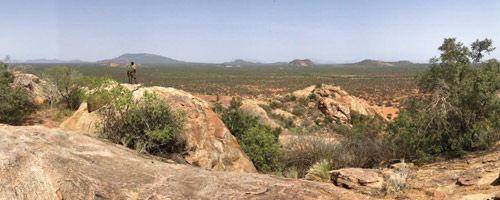|
COUNTER POACHING
WHAT IS IT GOOD FOR?
by Lieutenant A J K Wilson
Grenadier Guards
|
The inaugural Counter Poaching Operator’s Course is a six-week package run by 102 Logistic Brigade at the British Army Training Unit Kenya.
There are several phases of the course, each focusing on the skillset of the Counter Poaching Operator: Basic Tracking; Survival; Team Patrolling; Tactical Tracking; and the Final Exercise. The first was a non-tactical week where the candidates rediscovered their tracking skills from the introductory course. In the Survival week, the course was tested in an unusual fashion: restriction of food and water made each man understand how his body reacted to the harshest conditions, and how his thought processes changed under the stress of extreme hunger and thirst.
During Team Patrolling, the five-man teams worked on the fundamentals of soldiering: navigation by compass and pacing; communication via hand-signals; and various actions-on for small patrols; as well as staying out overnight to test their application of Survival week lessons. Tactical Tracking pushed the teams to detect and pursue spoor (the scent) in a covert manner, and led to several exciting encounters where the pursuing team managed to ambush the track laying team, an impressive feat in the difficult terrain of Archer’s Post.
 LCpl Dexter detaining a ‘poacher’ during the final exercise
LCpl Dexter detaining a ‘poacher’ during the final exercise |
The Final Exercise allowed the teams to understand the tactics they had been taught for the different animals they would be looking to protect, and apply them against a ‘poaching’ force consisting of some local trackers and two Malawian park rangers who had been mentoring and assisting during the course. It also tested the command and control of the team leaders in the Operations Centre, which will be their role on operations.
The course was ably led by several highly experienced instructors, with extensive experience in counter-poaching operations and training, as well as military experience in both the UK and South African Special Forces.
 The course learned to track across a variety of terrain, including rocky escarpments, which were undoubtedly the hardest, leaving little obvious ‘spoor’ The course learned to track across a variety of terrain, including rocky escarpments, which were undoubtedly the hardest, leaving little obvious ‘spoor’ |
The key lesson of the course was that tracking remains a fundamental soldiering skill, certainly for dismounted infantry and cavalry. The ability to distinguish between an infantry section and a Javelin Detachment by their tracks might make the difference between neutralising the enemy screen and walking into a company harbour position. This course also tested the lowest level of soldiering to its extreme: moving tactically through the bush in small teams; selecting and laying ambushes; pinpoint navigation by compass and features; patrolling as a detection screen. These skills are highly transferable and desirable across the Army, leaving the newly-qualified operators with a sense of confidence in their abilities, both as trackers and as point men for any patrol.
The aspiration is to create a Bush Warfare Wing based in BATUK that will teach these skills to the battlegroups moving through Exercise ASKARI STORM, increasing the pool of talent within the Army and dragging us all back to the fundamentals of our soldiering, in preparation for the next challenge. |
|


